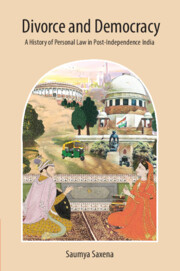Book contents
- Frontmatter
- Dedication
- Contents
- List of Figures
- Acknowledgements
- List of Abbreviations
- Introduction
- 1 Personal Law and the Making of Modern Religion, 1946–56
- 2 Committees, Codes, and Customs: Renegotiating Personal Law, 1957–69
- 3 Social Movements, National Emergency, and the Custody of the Constitution, 1967–79
- 4 Muslim Law, Hindu Nationalism, and Indian Secularisms, 1980–92
- 5 The Court in Context, 1992–2000s
- 6 From the Courtroom to the Courtyard: The Public Life of Personal Law, 2000–Present
- Conclusion
- Glossary
- Bibliography
- Index
6 - From the Courtroom to the Courtyard: The Public Life of Personal Law, 2000–Present
Published online by Cambridge University Press: 20 May 2022
- Frontmatter
- Dedication
- Contents
- List of Figures
- Acknowledgements
- List of Abbreviations
- Introduction
- 1 Personal Law and the Making of Modern Religion, 1946–56
- 2 Committees, Codes, and Customs: Renegotiating Personal Law, 1957–69
- 3 Social Movements, National Emergency, and the Custody of the Constitution, 1967–79
- 4 Muslim Law, Hindu Nationalism, and Indian Secularisms, 1980–92
- 5 The Court in Context, 1992–2000s
- 6 From the Courtroom to the Courtyard: The Public Life of Personal Law, 2000–Present
- Conclusion
- Glossary
- Bibliography
- Index
Summary
Social movements have historically demanded a change in law, in the hope that social change will eventually follow. In India, however, in many ways the nature of social activism, gender and party politics has overturned the Benthamite notion that ‘better laws make better societies’, particularly towards the turn of the twenty-first century. Innovations outside the law preceded the law and were slowly absorbed by legal institutions in the form of encouraging judgments, commission and committee reports, or hasty legislative interventions. This became especially palpable with activism around Muslim personal law where non-state institutions had already begun to successfully challenge and counter certain forms of discrimination against Muslim women which was only confirmed by the court later. Similarly, the idea that a Uniform Civil Code would be a solution to familial patriarchy had largely been rejected by many strands of the Indian women's movement after considerable debate in the early 2000s. This scepticism over a Uniform Civil Code was established years before the 21st Law Commission of India finally acknowledged that a uniform code may not yield just outcomes for women, in a consultation paper in 2018.
In the 1980s, there was a strong voice in favour of a ‘secular’ intervention in personal law within the women's movement. Overtime, however, increased scholarly focus on non-state adjudication of family law demonstrated that often religious reasoning could also underlie outcomes that are favourable to women. Through the study of divorce disputes across multiple forums, the chapter makes two central claims. First, the incoherence of legal communications, the uncertain implications of legislative and judicial interventions on personal law, and the misunderstandings that surround the interpretations of religious law and practice invariably decentralizes authority over authentic religious knowledge. Second, the legal archive produced through petitions, judgments, legislative debates, police records, and so on, is not representative of the spectrum of legal experience. Yet the unrecorded and unwritten experience of engaging the law provides meaningful insights on women's relationship with the state, religious community, and contemporary politics. Often this shared adjudication and inter-legality in personal law allows women to alter the terms of engagement and deploy new strategies of engagement or resistance against religious, communitarian, and state patriarchy.
- Type
- Chapter
- Information
- Divorce and DemocracyA History of Personal Law in Post-Independence India, pp. 278 - 320Publisher: Cambridge University PressPrint publication year: 2022



